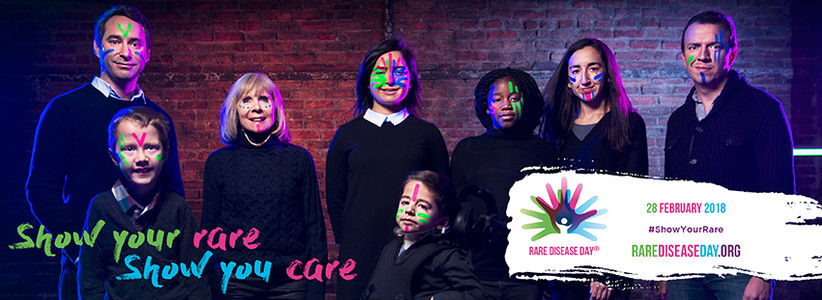Show your rare, show you care - Rare Disease Day 2018

Today is Rare Disease Day 2018 raising awareness of rare diseases and their impact on patients’ lives.
First launched in 2008, Rare Diseases Day now takes place annually on the last day of February, with support from over 94 countries around the world. It improves knowledge amongst the general public while encouraging researchers and decision makers to address the needs of those living with rare diseases.
Building awareness is critical - 1 in 20 people will live with a rare disease at some point in their life; despite this, there is no cure for the majority of rare diseases, and many go undiagnosed.
Research can also be challenging - diagnosis can be difficult with more than 7000 rare genetic disorders. Patients are also distributed over a wide geographic area - in Scotland an estimated 300,000 people live with a rare disease at any one time, 3.5million throughout the UK and approximately 30 million throughout Europe. Local cohorts for research are therefore limiting, and collaboration across the UK, Europe, and internationally is essential.
In Scotland, this activity is facilitated by NRS Genetics, recognising the genetic origin of many rare diseases. This opens up access to our world-class research infrastructure and expertise and supports efforts to bring together enough patients with particular conditions to make research projects feasible.
Such projects have included:
- Deciphering Developmental Disorders (DDD) study - investigating the use of new genetic technologies to help doctors understand why patients are affected by developmental disorders
- Go-SHARE ADR - to determine the genetic markers that make individuals susceptible to adverse drug reactions
- Genetic Variation in Myotonic Dystrophy - to understand how variation in the genetic material, DNA, of a person with the inherited disease myotonic dystrophy relates to the age of onset and progression of the symptoms throughout the life of the patient
- NIHR Bioresource Rare Diseases - supporting efforts to recruit participants with rare diseases and their relatives to establish a comprehensive repository of consented participants for current or future research
- Musketeer’s Memorandum - an agreement between the UK’s 23 genetic centres to link as one consortium to benefit rare genetic disease research by reducing the length of time taken to receive approval for a research proposal
As well as active clinical research currently ongoing, 2016 saw the launch of the Scottish Genomes Partnership (SGP) – a collaboration between Scottish Clinical Genetics Services, the Scottish National Services Division and Scottish Universities. The SGP will develop whole genome sequencing for the benefit of Scottish patients with rare diseases, which in its first phase includes whole genome sequencing for up to 1000 samples from patients with rare diseases and their families. On a national scale, this will lead to the development of pipelines for sample analysis as well as the bioinformatics infrastructure for using whole genome sequencing.
This presents a snapshot of Scotland’s commitment to driving high-quality research in rare disease. Dr Jonathan Berg, NRS Genetics Specialty Lead and Senior Lecturer and Honorary Consultant in Clinical Genetics, University of Dundee, commented:
“Research into rare diseases will always be more difficult because of the small number of people who are affected with any one condition. In Scotland, NHS Research Scotland, through NRS Genetics, supports national and international collaboration, leading to greater opportunities for people with rare genetic diseases to participate in research. This in turn leads to improved care and the development of new treatments.”
Anyone can contribute to Rare Diseases Day 2018 – every post, share or tweet adds to the awareness efforts and raises the profile of rare diseases in the public’s minds, the media, and with global health and development policymakers.
For more information, visit: https://rarediseaseday.org/.
Publication date: 28th February 2018

